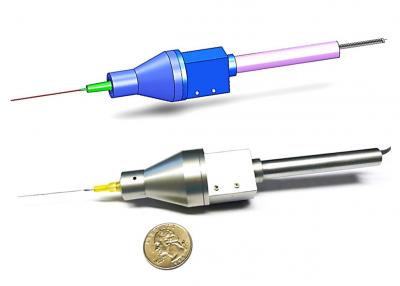Baltimore-based Johns Hopkins University Whiting School of Engineering and Johns Hopkins School of Medicine researchers have integrated computer-controlled piezoelectric motors to Optical Coherence Tomography (OCT) imaging technique as a distance sensor for optimizing the tip of a surgical tool.
 This shows the CAD model and prototype of the fiber-optic-sensor-based microsurgical tool, SMART
This shows the CAD model and prototype of the fiber-optic-sensor-based microsurgical tool, SMART
A paper reporting on the new device Smart Micromanipulation Aided Robotic-surgical Tool (SMART) was published in Optical Society's (OSA) open-access journal Optics Express.
Hand tremors are common while maneuvering at the order of 50-100 µm. In order to mitigate this condition and to enhance stability, a variety of optomechatronics techniques such as robotics have been developed. The researchers have been challenged to explore means for accurate measurement and regulation for the relative motions of a surgical instrument with respect to the target.
With improved resolution (up to 10 µm) and eye-safe feature near infrared light, OCT’s developing imaging technique is considered as an ideal tool for researchers.
The research team had to incorporate an OCT-based high-speed and -precision distance sensor within a compact, handheld surgical device so as to implement this versatile imaging technique. The device will then be able to handle several surgical instruments at the tip, for achieving right competence using this novel fiber-optic based common path optical coherence tomography (CP-OCT) technique. For transmission as well as receiving of near infrared light, the optical signal of this sensor utilizes the same path, or the same optical fiber.
The small size of the single fiber-optic cable enables equipping to the anterior portion of a tool used for eye surgery. Based on near infrared laser beams, the high-speed fiber-optic sensor can accurately track the movement of the probe. Input of this data to the computer is followed by signal transmission to small piezoelectric motors equipped to surgical device for leveraging the position of the tool tip, subsequently resulting in a series of "station keeping" maneuvers that minimizes hand tremors.
The sensor and motors together promotes operation precision of 500 Hz.
The system’s efficiency was tested based on its capability to compensate for hand tremors between 5- and 30-sec intervals. The tests were performed on two targets such as "phantom" material and viable chicken embryo. The researchers envision bringing this instrument to the industry.
Source: http://www.osa.org/